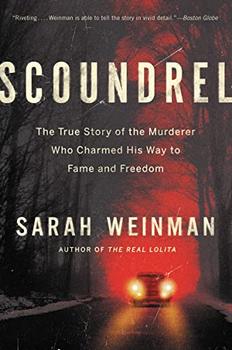Summary | Excerpt | Reviews | Beyond the Book | Readalikes | Genres & Themes | Author Bio

How a Convicted Murderer Persuaded the Women Who Loved Him, the Conservative Establishment, and the Courts to Set Him Free
by Sarah Weinman
The trial lasted two weeks and was a standing-room-only sensation. (Mary Higgins Clark, years before writing the novels that immortalized her as "the Queen of Suspense," attended every day and dated the beginning of her career as a crime writer to the case.) Smith testified in his own defense, and the resulting inconsistencies were noticed even by trial attendees as young as ten years old. It took less than two hours for the jury to convict him and the judge to sentence him to death. Smith kept appealing his execution and avoiding the electric chair. And since he was staying alive, he decided to better himself, enrolling in college classes, reading history books, and keeping up with current affairs through magazines.
Fate played a hand when William F. Buckley learned of a 1962 newspaper story about Smith in which the convict praised National Review as one of his favorite periodicals. Buckley and the National Review's intellectual stock were rising among conservatives, but he had only just begun to write his syndicated newspaper column, On the Right, and he was still several years away from his quixotic run for New York City mayor and the first broadcast of his interview show, Firing Line.
Buckley would later learn that Smith's access to National Review had been cut off after the prison official who lent him copies had been transferred away from the Death House. Sensing a story, feeling some pang of sympathy, or both, Buckley wrote Smith to ensure the prisoner would always receive a copy of National Review. Over the next nine years, through an exchange of more than 1,500 pages of correspondence, the two men became friends—and Buckley became convinced that Smith was not Zielinski's killer.
Buckley wrote about the case, and his belief in Edgar Smith's innocence, in several columns and in a 1965 story for Esquire; he used the fee he earned for the story to seed the Death House inmate's defense fund. Smith had been acting as his own jailhouse lawyer; now Buckley found Smith several lawyers to work on his appeals. Buckley also set Smith up with Sophie Wilkins, a dynamic and vivacious editor at the New York–based book-publishing firm Alfred A. Knopf. She worked closely with Smith on his 1968 book, Brief Against Death, which argued that the state of New Jersey's case against him was riddled with holes and attempted, above all, to persuade the reader that he had not killed Vickie Zielinski.
Wilkins, as I discovered while working in her archives at Columbia University, became more than Smith's editor. Their correspondence, which she preserved nearly in full, began in strictly professional fashion, with her recommending books to read and offering encouragement on the manuscript that became Brief Against Death. Then it devolved into something more.
They exchanged declarations of love, gifts and artwork, and mutual pornographic fantasies, his smuggled out through third parties to avoid the prying eyes of the Death House censors. He called her "Red"; she called him "Ilya." Their fights about editorial changes quickly spiraled out of control, and then they made up, lovers' quarrel style.
Wilkins would, in subsequent correspondence with Buckley, express rage and embarrassment at how besotted she had become with Smith and how foolishly she'd behaved.
But that was only after Brief Against Death became a critical and commercial success that prompted many conversations about the necessity of the death penalty, conversations that had been brewing throughout the decade as capital punishment began losing support among the American public. It made Smith a literary star. William F. Buckley promoted his advocacy on The Tonight Show, the Today show, and other major venues in support of the book, and Smith eventually became the first convicted murderer nominated to join PEN America. The book was chosen as an alternate pick of the Literary Guild and was reviewed by every major publication (including a glowing review by the crime novelist Ross Macdonald in the New York Times Book Review). Two years later, in 1970, his novel A Reasonable Doubt garnered similar acclaim, including praise from the hard-boiled writer James M. Cain.
Excerpted from Scoundrel by Sarah Weinman. Copyright © 2022 by Sarah Weinman. Excerpted by permission of Ecco. All rights reserved. No part of this excerpt may be reproduced or reprinted without permission in writing from the publisher.
Your guide toexceptional books
BookBrowse seeks out and recommends the best in contemporary fiction and nonfiction—books that not only engage and entertain but also deepen our understanding of ourselves and the world around us.